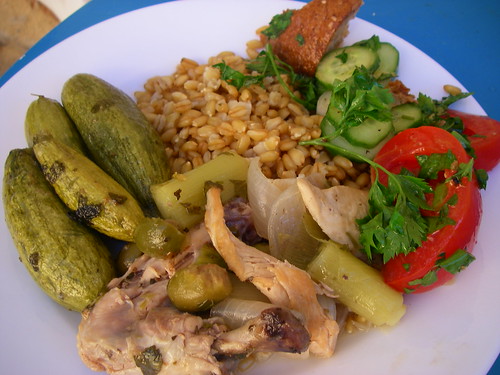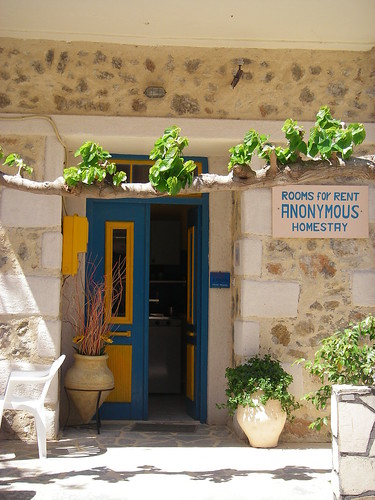Kotopoolo
“Kotopoolo, kotopoolo…” Sophia fell silent, shaking her head.
She had made it sound like the clucking of a hen. I thought that ‘pollo’, the Spanish word for chicken, was derived from the Greek, but it makes no sense. ‘Pollo’ (po-yo) doesn’t sound like any noise a chicken would make.
But I digress. Sophia wasn’t pleased. She shook her head again and muttered something in Greek, trying for the right words. “Spaghetti,” she said finally, pointing at the tiny stove with it’s single hotplate and a much smaller plate meant for heating jugs of Greek coffee. She looked disapprovingly at the herbs on the shelf, the spice box and the bottles of oils and vinegar.
“Spagetthi OK,” she reiterated and walked away, still shaking her head.
I may have been forgiven for imagining the homestay’s ‘communal kitchen facilities’ to be dominated by a large stove—perhaps an aga—with cooking paraphernalia hanging on hooks along the walls and wooden cutting boards surrounded by tins and jars. Somewhere in my imagination, a BBQ pit also featured, along with a roasting spit where we might gather to roast an Easter lamb, if one could be procured in time.
I didn’t imagine the facilities to be more along the lines of a tea kitchen, although to be fair there were several of them, and I was the only traveller to bring my own set of knives. Despite the place being fully booked, most of the kitchenettes remained unused.
Well, it was too late. The chicken that was defrosting on the sink needed cooking.
Take one chicken and joint it. Brown it in batches in a pot to which you have added a small slug of vegetable oil and a generous slosh of olive oil (the vegetable oil prevents the latter from burning. Don’t ask me why, but this trick also works with butter).
Set aside the pieces and add a roughly chopped onion to the pot. As soon as this has softened, add 2-3 cloves crushed garlic, some bay leaves and about 2 tsp of dried oregano (frying oily herbs increases their flavour).
When the mix begins to smell aromatic, add 300ml of white wine, return the chicken, add the zest and juice of 1 lemon (I also keep some preserved peel in my spice box, and that goes in as well), a handful of green olives and—since this dish wasn’t going to be braised—enough water or stock to just cover.
I couldn’t resist the tiny courgettes I’d spotted at the greengrocer’s (nor, for that matter, the aubergines, peppers, fresh garlic, spinach and whatnot), so I placed them on top, covered the pot and let the lot simmer for 45 minutes. Greek courgettes are thick-skinned and benefit from slowly steaming in their own juices.
Season and serve with bread, salad and couscous or wheat (which I managed to cook up on the tiny coffe plate).
As for the spinach which I’d also bought: it was nice prepared á’l horta, washed, steamed for a minute or so, with just the water that clings to the leaves, seasoned and tossed with a squirt of lemon juice and plenty of olive oil.
I made sure to keep the kitchen scrupulously clean and refrained from bringing further chickens, lambs or fishes onto the premises.
The next time she found me cooking, Sophia approved. She had come around with a cup of coffee and the divine lemon and vanilla cookies with which she spoils her guests.
She smiled. “Ah, spaghetti!”
No, a sausage, pepper and aubergine stew. I still had to use up that bounty from the greengrocer’s. When it was done, we carried it across to the courtyard to share with the other guests.
There’s no need to be over-ambitious when it comes to cooking on the road.
Tags: 'Round the World Recipes, Chicken, Cooking, Crete, Greece, Greece, Recipes, Tag Index

May 9th, 2008 at 18:58
[…] Kotopoolo […]
May 13th, 2008 at 15:53
[…] 7€ per kg.), remembering my promise about bringing fish, fowl or other creatures into the homestay kitchenette. Besides, I didn’t have the first idea how to set about preparing the […]